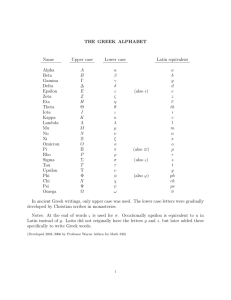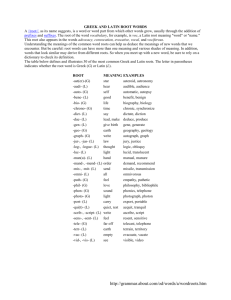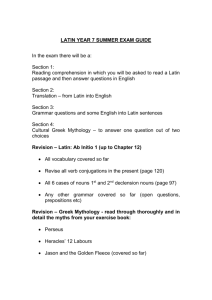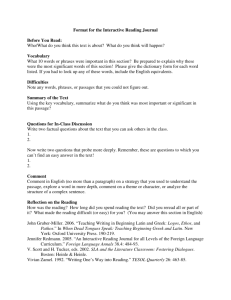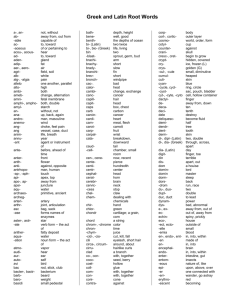LIST-10-WEEK-2
advertisement
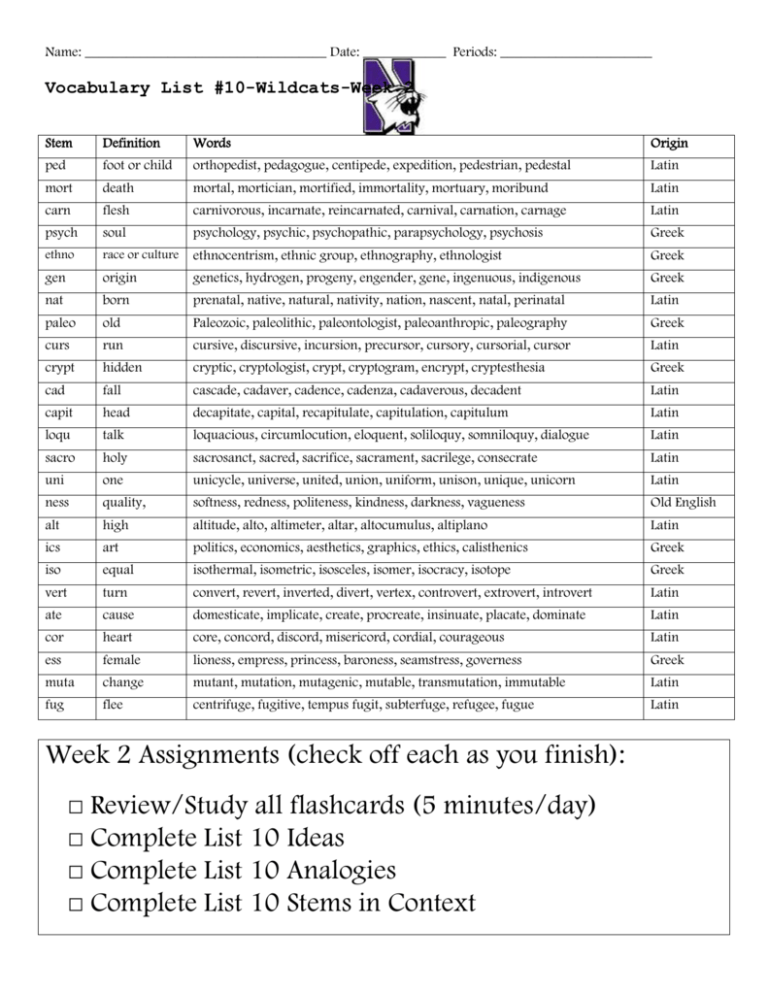
Name: ___________________________________ Date: ____________ Periods: ______________________ Vocabulary List #10-Wildcats-Week 2 Stem Definition Words Origin ped foot or child orthopedist, pedagogue, centipede, expedition, pedestrian, pedestal Latin mort death mortal, mortician, mortified, immortality, mortuary, moribund Latin carn flesh carnivorous, incarnate, reincarnated, carnival, carnation, carnage Latin psych soul psychology, psychic, psychopathic, parapsychology, psychosis Greek ethno race or culture ethnocentrism, ethnic group, ethnography, ethnologist Greek gen origin genetics, hydrogen, progeny, engender, gene, ingenuous, indigenous Greek nat born prenatal, native, natural, nativity, nation, nascent, natal, perinatal Latin paleo old Paleozoic, paleolithic, paleontologist, paleoanthropic, paleography Greek curs run cursive, discursive, incursion, precursor, cursory, cursorial, cursor Latin crypt hidden cryptic, cryptologist, crypt, cryptogram, encrypt, cryptesthesia Greek cad fall cascade, cadaver, cadence, cadenza, cadaverous, decadent Latin capit head decapitate, capital, recapitulate, capitulation, capitulum Latin loqu talk loquacious, circumlocution, eloquent, soliloquy, somniloquy, dialogue Latin sacro holy sacrosanct, sacred, sacrifice, sacrament, sacrilege, consecrate Latin uni one unicycle, universe, united, union, uniform, unison, unique, unicorn Latin ness quality, softness, redness, politeness, kindness, darkness, vagueness Old English alt high altitude, alto, altimeter, altar, altocumulus, altiplano Latin ics art politics, economics, aesthetics, graphics, ethics, calisthenics Greek iso equal isothermal, isometric, isosceles, isomer, isocracy, isotope Greek vert turn convert, revert, inverted, divert, vertex, controvert, extrovert, introvert Latin ate cause domesticate, implicate, create, procreate, insinuate, placate, dominate Latin cor heart core, concord, discord, misericord, cordial, courageous Latin ess female lioness, empress, princess, baroness, seamstress, governess Greek muta change mutant, mutation, mutagenic, mutable, transmutation, immutable Latin fug flee centrifuge, fugitive, tempus fugit, subterfuge, refugee, fugue Latin Week 2 Assignments (check off each as you finish): □ Review/Study all flashcards (5 minutes/day) □ Complete List 10 Ideas □ Complete List 10 Analogies □ Complete List 10 Stems in Context List 10 Ideas EMOTION 1. How would you feel if you were forced to capitulate (imagine the circumstances for yourself)? How would you feel if someone were forced to capitulate to you to you? Explain in 3-4 sentences. __________________________________________________________________________________________________ __________________________________________________________________________________________________ __________________________________________________________________________________________________ __________________________________________________________________________________________________ 2. Imagine your emotions if mutagenic substances were discovered in your drinking water, substances that could be traced to a nearby toxic waste dump. Who would you seek out for actions and explanations? Explain in 3-4 sentences. __________________________________________________________________________________________________ __________________________________________________________________________________________________ __________________________________________________________________________________________________ __________________________________________________________________________________________________ __________________________________________________________________________________________________ __________________________________________________________________________________________________ AESTHETICS 1. What sounds do these words suggestion: unison, carnival, darkness, centrifuge, refugee, sacrifice, Paleozoic, calisthenics, and universe. List 2-3 sounds for each word. Word 1. unison Sounds (2-3 for each word) Ex. Singing, chanting 2. carnival 3. darkness 4. centrifuge 5. refugee 6. sacrifice 7. Paleozoic 8. calisthenics 9. universe SYNTHESIS 1. Pick an example word in List #10 and use at least 3 other words to define the word you picked. Highlight each of these words. Word: ____________________________________________ Definition: ________________________________________________________________________________________ __________________________________________________________________________________________________ DIVERGENCE: 1. Have you ever been trapped by someone who wanted to talk about a subject you wished to avoid? Or who wanted to ask you a question you didn’t want to answer? How many clever subterfuges can you think of to escape such a situation? As an example, “I’d love to talk to you now, but I left a poodle in the petwash.” Give at least 2 examples: Example #1: _______________________________________________________________________________________ Example #2: _______________________________________________________________________________________ List 10 Analogies Directions: 1. Determine the meaning of the two bolded words. (SHOW ALL WORK) 2. Determine the relationship between the two bolded words 3. Choose the correct answer ___D___1 . Example: ______ 1 ethnologist: ethnic group :: antebellum: belligerency :: a. entomologist: altimeter a. antiaircraft: aircraft b. psychologist: ethnography b. nonstop: continuous c. paleontologist: tyrannosaurus c. cause: effect d. cryptologist: cryptograph d. morning: afternoon Answer Explanation (2-3 Sentences) __________________________________ Answer Explanation (2-3 Sentences) __________________________________ _The antebellum period comes before belligerency or state of being at war. The morning comes before the afternoon. __________________________________ __________________________________ __________________________________ __________________________________ __________________________________ ______ 2. unicycle: unique :: ______ 3. dialogue: soliloquy :: a. fugitive: refugee a. altimeter: altitude b. soliloquy: solitude b. mutagen: mutation c. extrovert: introvert c. colloquy: monologue d. concord: discord d. aesthetics: graphics Answer Explanation (2-3 Sentences) Answer Explanation (2-3 Sentences) __________________________________ __________________________________ __________________________________ __________________________________ __________________________________ __________________________________ __________________________________ __________________________________ __________________________________ __________________________________ __________________________________ __________________________________ __________________________________ __________________________________ ______ 4. subterfuge: fugitive:: domination: capitulation:: a. circumlocution: orthopedist a. decapitate: recapitulate b. politics: economics b. natal: perinatal c. lioness: empire c. pedagogue: pedestrian d. ingenuous: indigenous d. rule: surrender Answer Explanation (2-3 Sentences) ______ 6. ______ 5. Answer Explanation (2-3 Sentences) __________________________________ __________________________________ __________________________________ __________________________________ __________________________________ __________________________________ __________________________________ __________________________________ __________________________________ __________________________________ __________________________________ __________________________________ lioness: carnivorous:: a. extrovert: loquacious b. convert: introvert c. sacrifice: sanguinary d. alto: cadenza Answer Explanation (2-3 Sentences) __________________________________ __________________________________ __________________________________ __________________________________ __________________________________ __________________________________ List 10 Stems in Context Directions: Read the following passages and answer the questions that follow: Role of the President of the United States Excerpts from the United States Constitution, Article II Section 1: The executive Power shall be vested1 in a President of the United States of America. He shall hold his Office during the Term of four Years, and, together with the Vice President, chosen for the same Term, be elected, as follows: [. . .] No Person except a natural born Citizen, or a Citizen of the United States, at the time of the Adoption of this Constitution, shall be eligible2 to the Office of President; neither shall any Person be eligible to that Office who shall not have attained to the Age of thirty five Years, and been fourteen Years a Resident within the United States. [. . .] The President shall, at stated Times, receive for his Services, a Compensation, which shall neither be increased nor diminished during the Period for which he shall have been elected, and he shall not receive within that Period any other Emolument [salary or profit] from the United States, or any of them. Before he enter on the Execution of his Office, he shall take the following Oath or Affirmation: ‐‐ "I do solemnly swear (or affirm) that I will faithfully execute the Office of President of the United States, and will to the best of my Ability, preserve, protect and defend the Constitution of the United States." Section 2: The President shall be Commander in Chief of the Army and Navy of the United States, and of the Militia of the several States, when called into the actual Service of the United States . . . He shall have Power, by and with the Advice and Consent of the Senate, to make Treaties, provided two thirds of the Senators present concur3; and he shall nominate, and by and with the Advice and Consent of the Senate, shall appoint Ambassadors, other public Ministers and Consuls, Judges of the supreme Court, and all other Officers of the United States, whose Appointments are not herein otherwise provided for, and which shall be established by Law: but the Congress may by Law vest the Appointment of such inferior Officers, as they think proper, in the President alone, in the Courts of Law, or in the Heads of Departments.[. . .] Section 3: He shall from time to time give to the Congress Information of the State of the Union, and recommend to their Consideration such Measures as he shall judge necessary and expedient; he may, on extraordinary Occasions, convene both Houses, or either of them, and in Case of Disagreement between them, with Respect to the Time of Adjournment4, he may adjourn them to such Time as he shall think proper; he shall receive Ambassadors and other public Ministers; he shall take Care that the Laws be faithfully executed, and shall Commission all the Officers of the United States. Section 4: The President, Vice President and all civil Officers of the United States, shall be removed from Office on Impeachment for, and Conviction of, Treason, Bribery, or other high Crimes and Misdemeanors. Excerpt from the 25th Amendment Section 1: In case of the removal of the President from office or of his death or resignation, the Vice President shall become President. 1 vest ‐ to place (authority, property, or rights, for example) in the control of a person or group 2 eligible – qualified or able to do something, such as run for office 3 concur – to agree 4 adjournment – temporary stopping of a trial, enquiry, or other meeting 1. Find the word natural in the passage. Write the sentence that contains the word natural below: __________________________________________________________________________________________________ _______Based on the following dictionary definitions, which definition is closest to natural as it is used in the passage? a. arising easily b. free from constraint c. not artificially dyed d. entitled by birth 2. Find the word expedient in the passage. Write the sentence that contains the word expedient below: __________________________________________________________________________________________________ _______Based on the following dictionary definitions, which definition is closest to expedient as it is used in the passage? a. suitable to the circumstances; appropriate b. inclined towards methods or means that are advantageous c. something achieving objectives quickly d. advantageous for practical rather than moral reasons 3. Find the word nominate in the passage. Write the sentence that contains the word nominate below: __________________________________________________________________________________________________ _______Based on the following thesaurus entry, which synonym is closest to nominate as it is used in the passage? a. having a particular name b. designate c. to propose a candidate; especially for an election d. to name (someone) to act on one’s behalf Name: ___________________________________ Date: ____________ Periods: ______________________ List 10 Illini-Week 2 Stem Definition Words Origin ped foot or child orthopedist, pedagogue, centipede, expedition, pedestrian, pedestal Latin mort death mortal, mortician, mortified, immortality, mortuary, moribund Latin carn flesh carnivorous, incarnate, reincarnated, carnival, carnation, carnage Latin ethno race or culture ethnocentrism, ethnic group, ethnography, ethnologist Greek gen origin genetics, hydrogen, progeny, engender, gene, ingenuous, indigenous Greek nat born prenatal, native, natural, nativity, nation, nascent, natal, perinatal Latin paleo old Paleozoic, paleolithic, paleontologist, paleoanthropic, paleography Greek capit head decapitate, capital, recapitulate, capitulation, capitulum Latin loqu talk loquacious, circumlocution, eloquent, soliloquy, somniloquy, dialogue Latin uni one unicycle, universe, united, union, uniform, unison, unique, unicorn Latin alt high altitude, alto, altimeter, altar, altocumulus, altiplano Latin vert turn convert, revert, inverted, divert, vertex, controvert, extrovert, introvert Latin cor heart core, concord, discord, misericord, cordial, courageous Latin ess female lioness, empress, princeess, baroness, seamstress, governess Greek Week 2 Assignments (check off each as you finish): □ □ □ □ Review/Study all flashcards (5 minutes/day) Complete List 10 Ideas Complete List 10 Analogies Complete List 10 Stems in Context List 10 Ideas EMOTION 1. How would you feel if you were forced to capitulate (imagine the circumstances for yourself)? How would you feel if someone were forced to capitulate to you to you? Explain in 3-4 sentences. __________________________________________________________________________________________________ __________________________________________________________________________________________________ __________________________________________________________________________________________________ __________________________________________________________________________________________________ AESTHETICS 1. What sounds do these words suggestion: unison, carnival, Paleozoic, and universe. List 2-3 sounds for each word. Word 1. unison Sounds (2-3 for each word) Ex. Singing, chanting 2. carnival 3. Paleozoic 4. universe SYNTHESIS 1. Pick an example word in List #10 and use at least 3 other words to define the word you picked. Highlight each of these words. Word: ____________________________________________ Definition: ________________________________________________________________________________________ __________________________________________________________________________________________________ DIVERGENCE: 1. Think of a time you have felt very embarrassed or foolish. Describe 2 times you have felt completely mortified. Example #1: _______________________________________________________________________________________ Example #2: _______________________________________________________________________________________ List 10 Analogies Directions: 1. Determine the meaning of the two bolded words. 2. Determine the relationship between the two bolded words 3. Choose the correct answer Answer Analogy Example: hypothesis: thesis :: ___a___ a. guess: idea b. theory: regenerate c. respect: hypotenuse d. idea: image Work Definitions: Hypothesis: Guess or proposition Thesis : Theory or idea lioness: carnivorous:: Relationship between bolded words: (Complete Sentence): The first word hypothesis means to make a guess. The second word theory means to make a theory or form an idea on a topic. Definitions: a. extrovert: loquacious lioness: __________________________________________ b. convert: introvert carnivorous: __________________________________________ c. sacrifice: sanguinary Relationship between bolded words: (Complete Sentence): _________________________________________________________ _________________________________________________________ _______1. d. alto: cadenza _______ 2. ethnologist: ethnic group :: Definitions: a. entomologist: altimeter ethnologist: ___________________________________________ b. psychologist: ethnography ethnic group: _________________________________________ c. paleontologist: tyrannosaurus dialogue: soliloquy :: Relationship between bolded words: (Complete Sentence): _________________________________________________________ _________________________________________________________ Definitions: a. altimeter: gene dialogue: ___________________________________________ b. mutagen: centipede soliloquy: __________________________________________ d. cryptologist: unicycle _______ 3. c. monologue: unicorn domination: capitulation:: Relationship between bolded words: (Complete Sentence): _________________________________________________________ _________________________________________________________ Definitions: a. decapitate: carnival domination: _____________________________________ _____ b. natal: carnation capitulation: __________________________________ d. aesthetics: graphics _______ 4. c. pedestrian: core d. rule: surrender _____ Relationship between bolded words: (Complete Sentence): _________________________________________________________ _________________________________________________________ List 10 Stems in Context Directions: Read the following passages and answer the questions that follow: Role of the President of the United States Excerpts from the United States Constitution, Article II Section 1: The executive Power shall be vested1 in a President of the United States of America. He shall hold his Office during the Term of four Years, and, together with the Vice President, chosen for the same Term, be elected, as follows: [. . .] No Person except a natural born Citizen, or a Citizen of the United States, at the time of the Adoption of this Constitution, shall be eligible2 to the Office of President; neither shall any Person be eligible to that Office who shall not have attained to the Age of thirty five Years, and been fourteen Years a Resident within the United States. [. . .] The President shall, at stated Times, receive for his Services, a Compensation, which shall neither be increased nor diminished during the Period for which he shall have been elected, and he shall not receive within that Period any other Emolument [salary or profit] from the United States, or any of them. Before he enter on the Execution of his Office, he shall take the following Oath or Affirmation: ‐‐ "I do solemnly swear (or affirm) that I will faithfully execute the Office of President of the United States, and will to the best of my Ability, preserve, protect and defend the Constitution of the United States." Section 2: The President shall be Commander in Chief of the Army and Navy of the United States, and of the Militia of the several States, when called into the actual Service of the United States . . . He shall have Power, by and with the Advice and Consent of the Senate, to make Treaties, provided two thirds of the Senators present concur3; and he shall nominate, and by and with the Advice and Consent of the Senate, shall appoint Ambassadors, other public Ministers and Consuls, Judges of the supreme Court, and all other Officers of the United States, whose Appointments are not herein otherwise provided for, and which shall be established by Law: but the Congress may by Law vest the Appointment of such inferior Officers, as they think proper, in the President alone, in the Courts of Law, or in the Heads of Departments.[. . .] Section 3: He shall from time to time give to the Congress Information of the State of the Union, and recommend to their Consideration such Measures as he shall judge necessary and expedient; he may, on extraordinary Occasions, convene both Houses, or either of them, and in Case of Disagreement between them, with Respect to the Time of Adjournment4, he may adjourn them to such Time as he shall think proper; he shall receive Ambassadors and other public Ministers; he shall take Care that the Laws be faithfully executed, and shall Commission all the Officers of the United States. Section 4: The President, Vice President and all civil Officers of the United States, shall be removed from Office on Impeachment for, and Conviction of, Treason, Bribery, or other high Crimes and Misdemeanors. Excerpt from the 25th Amendment Section 1: In case of the removal of the President from office or of his death or resignation, the Vice President shall become President. 1 vest ‐ to place (authority, property, or rights, for example) in the control of a person or group 2 eligible – qualified or able to do something, such as run for office 3 concur – to agree 4 adjournment – temporary stopping of a trial, enquiry, or other meeting 1. Find the word natural in the passage. Write the sentence that contains the word natural below: __________________________________________________________________________________________________ _______Based on the following dictionary definitions, which definition is closest to natural as it is used in the passage? a. arising easily b. free from constraint c. not artificially dyed d. entitled by birth 2. Find the word expedient in the passage. Write the sentence that contains the word expedient below: __________________________________________________________________________________________________ _______Based on the following dictionary definitions, which definition is closest to expedient as it is used in the passage? a. suitable to the circumstances; appropriate b. inclined towards methods or means that are advantageous c. something achieving objectives quickly d. advantageous for practical rather than moral reasons 3. Find the word United in the passage. Write the sentence that contains the word United below: __________________________________________________________________________________________________ _______Based on the following thesaurus entry, which synonym is closest to United as it is used in the passage? a. agreed; in harmony b. to cause to adhere c. to join as one unit d. to hold a common opinion or attitude Name: ___________________________________ Date: ____________ Periods: ______________________ List 10 Huskies-Week 2 Stem Definition Words Origin ped foot or child orthopedist, centipede, expedition, pedestrian, pedestal Latin mort death mortal, mortician, mortified, immortality, mortuary Latin carn flesh carnivorous, reincarnated, carnival, carnation, carnage Latin gen origin genetics, hydrogen, gene, ingenuous, indigenous Greek nat born prenatal, native, natural, nativity, nation, natal, perinatal Latin paleo old Paleozoic, paleolithic, paleontologist, paleoanthropic, paleography Greek loqu talk loquacious, circumlocution, eloquent, soliloquy, somniloquy, dialogue Latin uni one unicycle, universe, united, union, uniform, unison, unique, unicorn Latin ess female lioness, empress, princeess, baroness, seamstress, governess Greek Week 2 Assignments (check off each as you finish): □ Review/Study all flashcards (5 minutes/day) □ Complete List 10 Ideas □ Complete List 10 True/False □ Complete List 10 Stems in Context List 10 Ideas 1. What are 3 physical characteristics determined by genes. (ex. eye color) 1. ____________________________________ 2. ____________________________________ 3. ____________________________________ 2. What are 5 plants or animals that are native to Illinois? 1. ____________________________________ 2. ____________________________________ 3. ____________________________________ 4. ____________________________________ 5. ____________________________________ 3. Describe an expedition you’ve completed in 3-4 sentences. __________________________________________________________________________________________________ __________________________________________________________________________________________________ __________________________________________________________________________________________________ __________________________________________________________________________________________________ __________________________________________________________________________________________________ 4. A unicorn is an imaginary animal with one horn. Create a name and description for 1 other imaginary animal using a stem from this week’s list. Name of Animal: _______________________________ (Highlight Stem) Description of Animal: _______________________________________________________________________________ __________________________________________________________________________________________________ __________________________________________________________________________________________________ 5. Pick an example word in List #10 and use at least 3 other words to define the word you picked. Highlight each of these words. Word: ____________________________________________ Definition: ________________________________________________________________________________________ __________________________________________________________________________________________________ 6. Think of a time you have felt very embarrassed or foolish. Describe 2 times you have felt completely mortified. Example #1: _______________________________________________________________________________________ Example #2: _______________________________________________________________________________________ List 10 True/False Directions: Determine if each statement is true or false. If it is false rewrite it and make it true. ____1. A carnivorous animal only eats plant. __________________________________________________________________________________________ ____ 2. Hydrogen is the lightest of all elements on the periodic table. __________________________________________________________________________________________ ____ 3. Pedestrians drive cars or ride trains. __________________________________________________________________________________________ ____ 4. Mothers who are expecting babies receive prenatal care. _________________________________________________________________________________________ List 10 Stems in Context Early People in the Central American Land Bridge James Folta People have been living in Central and South America for many, many years now. How did ancient people live in this area thousands of years ago? Archaeologists studying the area of the Central American land bridge have been working to answer this question. What is the Central American land bridge? It is the land that is now the countries of Costa Rica and Panama. Like a modern bridge over a river, this land bridge was used by animals and people to travel back and forth. This Central American land bridge unites the northern land that is now Nicaragua, Mexico and so on to the southern land that is now Colombia, Brazil, and other South American states. People who were already living in North America traveled down and across this land bridge. Scientists think they traveled there around 11,000 BCE. They probably were following large animals that they hunted and ate. These people would have traveled on foot, following the herds of animals. They had no permanent houses. They would pack up their things and bring them along as they hunted. Their homes were like tents and were very easy to take down and put up. Archaeologists can tell these people traveled via the land bridge because they have found similar arrow heads and tools in both the land bridge and in areas further north and south. These tools are the main record of people's movement and settlement. Archaeologists don't find evidence of these tools very often. When so much time passes, natural things like rain, dirt and trees destroy and bury them. Scientists also think the oceans were lower back then. This means there once was more land that is now underwater. Probably there is more evidence of people living in the area under the sea off the coasts of Costa Rica and Panama. It is hard to tell when people stopped traveling along the land bridge and began living there. One clue is when people began farming. On the land bridge, this was around 9,000 and 7,000 BCE. In Panama, scientists have found evidence that people were growing bottle gourds, squash, and a few other things around that time. These would be in small gardens, not big farms. People weren't eating just the plants they grew at this time. They would gather fruits and nuts from the forest, hunt deer, fish for crabs and fish, as well as eat from their gardens. Archaeologists now think that some forests were actually farms too, which makes it harder to determine when hunting and gathering stopped. Slowly, people built more permanent houses on the land bridge. The first small village archaeologists have found is in Costa Rica, in a place called Tronadora Vieja. There are round pole and thatch houses, which are simple huts made out of long tree branches covered in leaves and grasses. These houses date to 3,800 BCE and were destroyed when a nearby volcano exploded and buried them in ash. Archaeologists are still studying this part of the world. Hopefully in the years to come, we can find out more about how ancient indigenous people lived on the Central American land bridge. 1. Find the word natural in the passage. Write the sentence that contains the word natural below: __________________________________________________________________________________________________ _______Based on the following dictionary definitions, which definition is closest to natural as it is used in the passage? a. growing wild b. relating to the universe c. existing or formed by nature d. not adopted, but rather by blood 2. Find the word indigenous in the passage. Write the sentence that contains the word indigenous below: __________________________________________________________________________________________________ _______Based on the following dictionary definitions, which definition is closest to indigenous as it is used in the passage? a. innate or instinctive b. originating in a particular region or country c. characteristic of a different country or state d. born in a particular city _______3. Which evidence from “Becoming a Doctor” supports the correct answer to number 2? a. “One clue is when people began farming.” b. “Archaeologists studying the area of the Central American land bridge have been working to answer this question. “ c. “People have been living in Central and South America for many, many years now. d. “They probably were following large animals that they hunted and ate” Name: ___________________________________ Date: ____________ Periods: ______________________ List 10 Redbirds –Week 2 Stem Definition Words Origin ped foot or child centipede, expedition, pedestrian, pedestal Latin carn flesh carnivorous, reincarnated, carnival, carnation, carnage Latin gen origin genetics, hydrogen, gene, indigenous Greek nat born prenatal, native, natural, nativity, nation Latin uni one unicycle, universe, united, union, uniform, unison, unique, unicorn Latin Definitions expedition (n) an organized journey or travel by a group of people pedestrian (n) a person who is walking carnivorous (adj) an animal that eats meat or flesh hydrogen (n) a colorless, odorless gas, the lightest of all known elements gene (n) a part of a cell that controls the development of a living thing indigenous (adj) native or original to particular region or environment native (adj) born in a particular place prenatal (adj) relating to unborn babies unison (n) one sound together at the same time uniform (n) one type of clothing worn by all members of a group Sentences The Louis and Clark expedition explored the recently acquired Louisiana Purchase. Pedestrians must take care to use a crosswalk to avoid collisions with cars. The carnivorous animal leapt upon the rabbit, killed it, and ate it. Hydrogen is the lightest and most abundant chemical element. One particular gene determines a person’s eye color. Native Americans are indigenous to the United States. Lions and tigers are native to the continent of Africa. Most women expecting babies are advised to take a prenatal vitamin. Students recite The Pledge of Allegiance in unison each morning. After playing soccer in the rain each players’ uniform was muddy and grass stained. Week 2 Assignments (check off each as you finish): □ Review/Study all flashcards (5 minutes/day) □ Complete List 10 Ideas □ Complete List 10 True/False □ Complete List 10 Stems in Context List 10 Ideas 1. What are 3 physical characteristics determined by genes. (ex. eye color) 1. ____________________________________ 2. ____________________________________ 3. ____________________________________ 2. Should students at Frost be forced to wear a uniform? Explain your position in 3-4 sentences. __________________________________________________________________________________________________ __________________________________________________________________________________________________ __________________________________________________________________________________________________ __________________________________________________________________________________________________ __________________________________________________________________________________________________ 3. What are 5 plants or animals that are native to Illinois? 1. ____________________________________ 2. ____________________________________ 3. ____________________________________ 4. ____________________________________ 5. ____________________________________ 4. Describe an expedition you’ve completed in 3-4 sentences. __________________________________________________________________________________________________ __________________________________________________________________________________________________ __________________________________________________________________________________________________ __________________________________________________________________________________________________ __________________________________________________________________________________________________ 5. A unicorn is an imaginary animal with one horn. Create a name and description for 2 other imaginary animals using a stem from this week’s list. Name of Animal: _______________________________ (Highlight Stem) Description of Animal: _______________________________________________________________________________ __________________________________________________________________________________________________ __________________________________________________________________________________________________ Name of Animal: _______________________________ (Highlight Stem) Description of Animal: _______________________________________________________________________________ __________________________________________________________________________________________________ __________________________________________________________________________________________________ List 10 True/False Directions: Determine if each statement is true or false. If it is false rewrite it and make it true. ____1. A carnivorous animal only eats plant. __________________________________________________________________________________________ ____ 2. Hydrogen is the lightest of all elements on the periodic table. __________________________________________________________________________________________ ____ 3. Pedestrians drive cars or ride trains. __________________________________________________________________________________________ ____ 4. Mothers who are expecting babies receive prenatal care. _________________________________________________________________________________________ List 10 Stems in Context Early People in the Central American Land Bridge James Folta People have been living in Central and South America for many, many years now. How did ancient people live in this area thousands of years ago? Archaeologists studying the area of the Central American land bridge have been working to answer this question. What is the Central American land bridge? It is the land that is now the countries of Costa Rica and Panama. Like a modern bridge over a river, this land bridge was used by animals and people to travel back and forth. This Central American land bridge unites the northern land that is now Nicaragua, Mexico and so on to the southern land that is now Colombia, Brazil, and other South American states. People who were already living in North America traveled down and across this land bridge. Scientists think they traveled there around 11,000 BCE. They probably were following large animals that they hunted and ate. These people would have traveled on foot, following the herds of animals. They had no permanent houses. They would pack up their things and bring them along as they hunted. Their homes were like tents and were very easy to take down and put up. Archaeologists can tell these people traveled via the land bridge because they have found similar arrow heads and tools in both the land bridge and in areas further north and south. These tools are the main record of people's movement and settlement. Archaeologists don't find evidence of these tools very often. When so much time passes, natural things like rain, dirt and trees destroy and bury them. Scientists also think the oceans were lower back then. This means there once was more land that is now underwater. Probably there is more evidence of people living in the area under the sea off the coasts of Costa Rica and Panama. It is hard to tell when people stopped traveling along the land bridge and began living there. One clue is when people began farming. On the land bridge, this was around 9,000 and 7,000 BCE. In Panama, scientists have found evidence that people were growing bottle gourds, squash, and a few other things around that time. These would be in small gardens, not big farms. People weren't eating just the plants they grew at this time. They would gather fruits and nuts from the forest, hunt deer, fish for crabs and fish, as well as eat from their gardens. Archaeologists now think that some forests were actually farms too, which makes it harder to determine when hunting and gathering stopped. Slowly, people built more permanent houses on the land bridge. The first small village archaeologists have found is in Costa Rica, in a place called Tronadora Vieja. There are round pole and thatch houses, which are simple huts made out of long tree branches covered in leaves and grasses. These houses date to 3,800 BCE and were destroyed when a nearby volcano exploded and buried them in ash. Archaeologists are still studying this part of the world. Hopefully in the years to come, we can find out more about how ancient indigenous people lived on the Central American land bridge. 1. Find the word natural in the passage. Write the sentence that contains the word natural below: __________________________________________________________________________________________________ _______Based on the following dictionary definitions, which definition is closest to natural as it is used in the passage? a. growing wild b. existing or formed by nature c. relating to the universe 2. Find the word indigenous in the passage. Write the sentence that contains the word indigenous below: __________________________________________________________________________________________________ _______Based on the following dictionary definitions, which definition is closest to indigenous as it is used in the passage? a. characteristic of a different country or state b. born in a particular city c. originating in a particular region or country _______3. Which evidence from “Becoming a Doctor” supports the correct answer to number 2? a. “People have been living in Central and South America for many, many years now. b. “One clue is when people began farming.” c. “They probably were following large animals that they hunted and ate”

